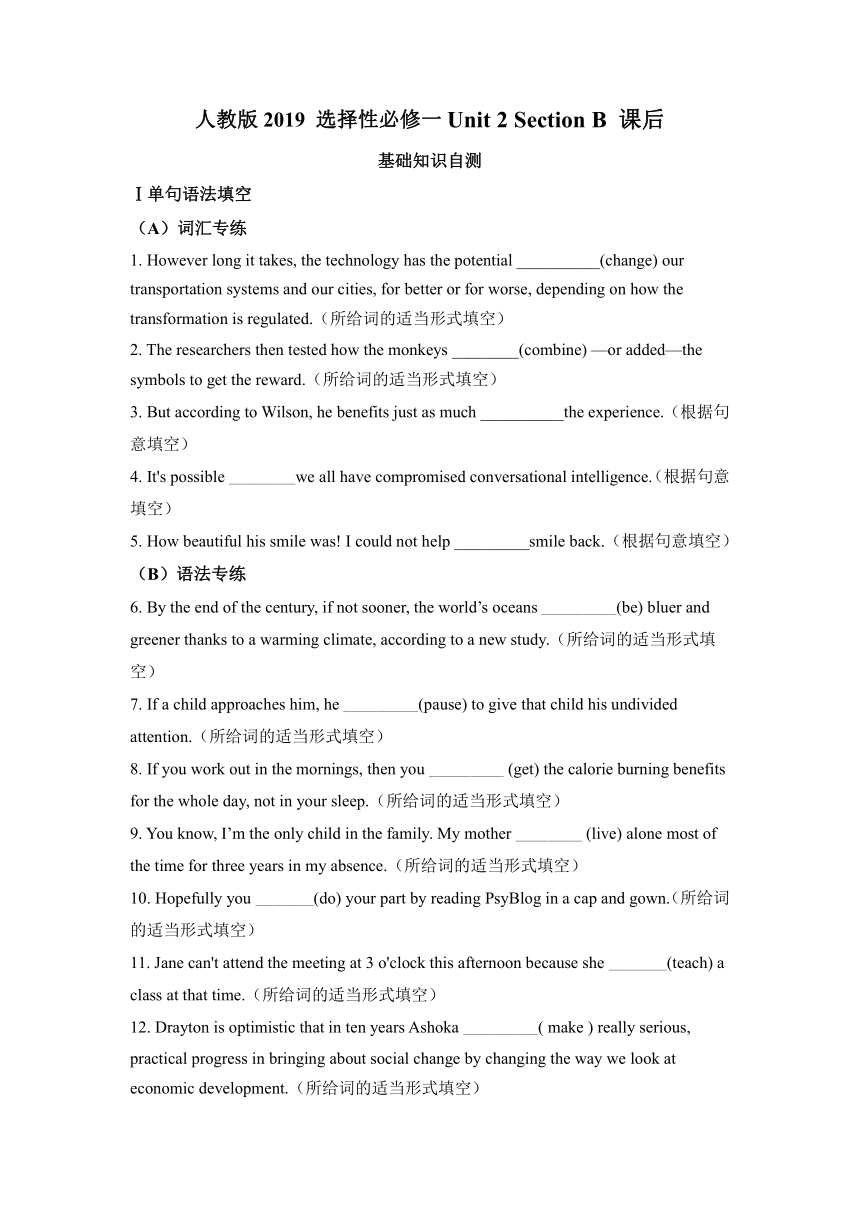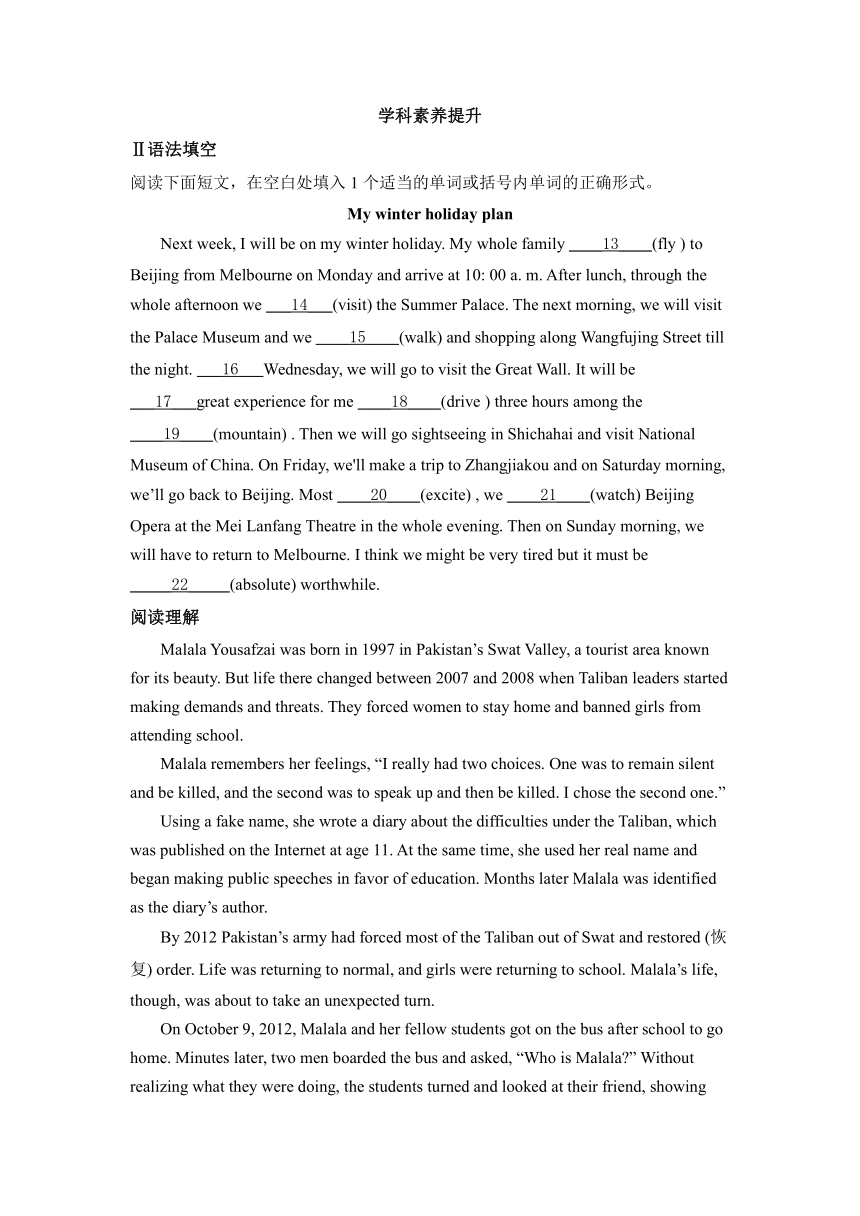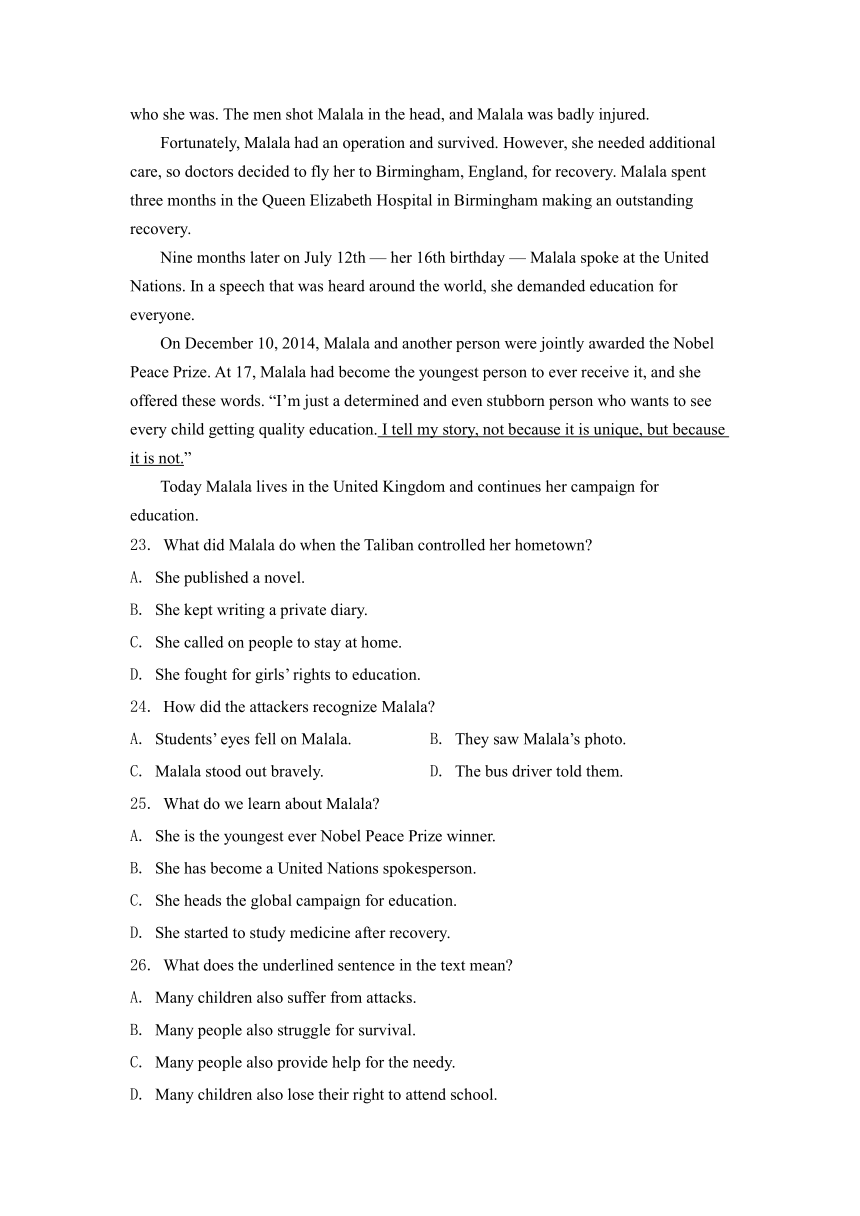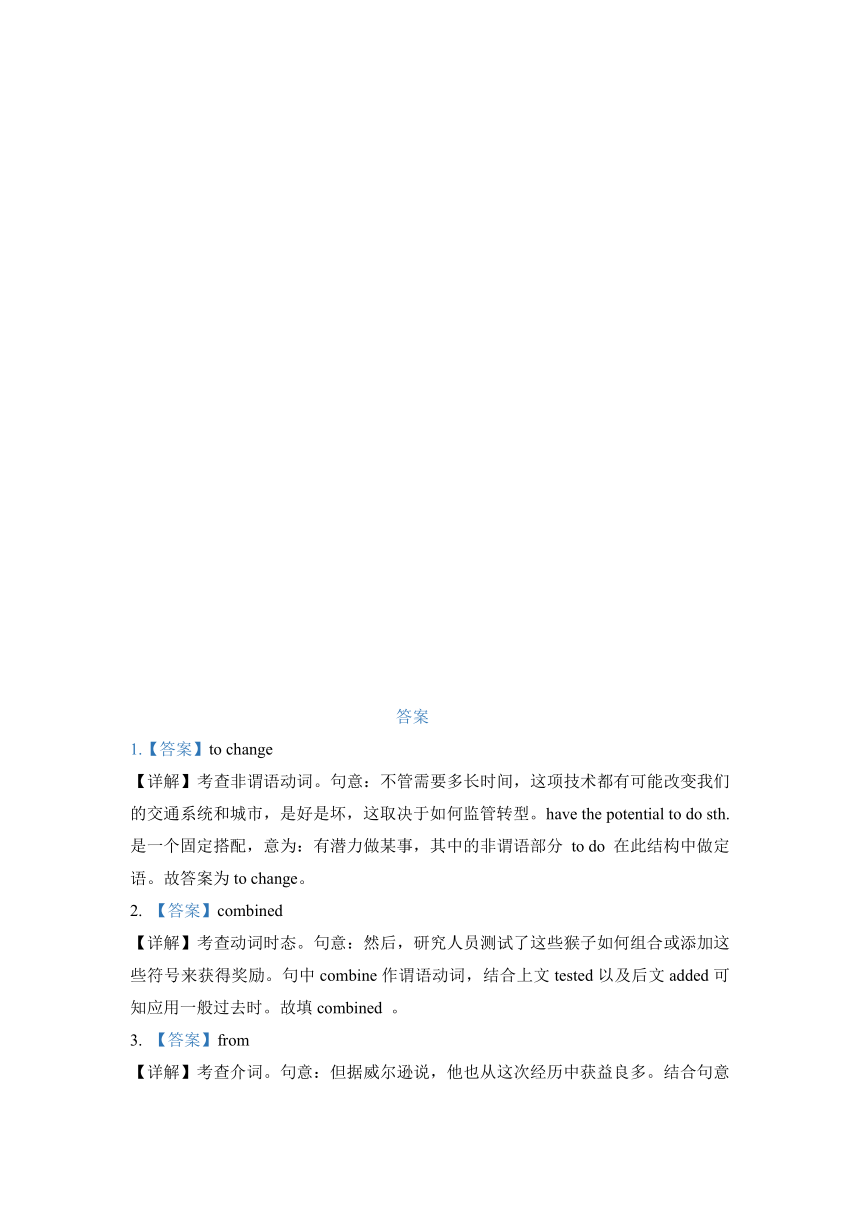人教版(2019)选择性必修一:Unit2 Looking into the Future SectionB (课后作业)(含答案)
文档属性
| 名称 | 人教版(2019)选择性必修一:Unit2 Looking into the Future SectionB (课后作业)(含答案) |  | |
| 格式 | doc | ||
| 文件大小 | 53.0KB | ||
| 资源类型 | 教案 | ||
| 版本资源 | 人教版(2019) | ||
| 科目 | 英语 | ||
| 更新时间 | 2021-10-07 23:32:37 | ||
图片预览




文档简介
人教版2019
选择性必修一Unit
2
Section
B
课后
基础知识自测
Ⅰ单句语法填空
(A)词汇专练
1.
However
long
it
takes,
the
technology
has
the
potential
__________(change)
our
transportation
systems
and
our
cities,
for
better
or
for
worse,
depending
on
how
the
transformation
is
regulated.(所给词的适当形式填空)
2.
The
researchers
then
tested
how
the
monkeys
________(combine)
—or
added—the
symbols
to
get
the
reward.(所给词的适当形式填空)
3.
But
according
to
Wilson,
he
benefits
just
as
much
__________the
experience.(根据句意填空)
4.
It's
possible
________we
all
have
compromised
conversational
intelligence.(根据句意填空)
5.
How
beautiful
his
smile
was!
I
could
not
help
_________smile
back.(根据句意填空)
(B)语法专练
6.
By
the
end
of
the
century,
if
not
sooner,
the
world’s
oceans
_________(be)
bluer
and
greener
thanks
to
a
warming
climate,
according
to
a
new
study.(所给词的适当形式填空)
7.
If
a
child
approaches
him,
he
_________(pause)
to
give
that
child
his
undivided
attention.(所给词的适当形式填空)
8.
If
you
work
out
in
the
mornings,
then
you
_________
(get)
the
calorie
burning
benefits
for
the
whole
day,
not
in
your
sleep.(所给词的适当形式填空)
9.
You
know,
I’m
the
only
child
in
the
family.
My
mother
________
(live)
alone
most
of
the
time
for
three
years
in
my
absence.(所给词的适当形式填空)
10.
Hopefully
you
_______(do)
your
part
by
reading
PsyBlog
in
a
cap
and
gown.(所给词的适当形式填空)
11.
Jane
can't
attend
the
meeting
at
3
o'clock
this
afternoon
because
she
_______(teach)
a
class
at
that
time.(所给词的适当形式填空)
12.
Drayton
is
optimistic
that
in
ten
years
Ashoka
_________(
make
)
really
serious,
practical
progress
in
bringing
about
social
change
by
changing
the
way
we
look
at
economic
development.(所给词的适当形式填空)
学科素养提升
Ⅱ语法填空
阅读下面短文,在空白处填入1个适当的单词或括号内单词的正确形式。
My
winter
holiday
plan
Next
week,
I
will
be
on
my
winter
holiday.
My
whole
family
____13____(fly
)
to
Beijing
from
Melbourne
on
Monday
and
arrive
at
10:
00
a.
m.
After
lunch,
through
the
whole
afternoon
we
___14___(visit)
the
Summer
Palace.
The
next
morning,
we
will
visit
the
Palace
Museum
and
we
____15____(walk)
and
shopping
along
Wangfujing
Street
till
the
night.
___16___Wednesday,
we
will
go
to
visit
the
Great
Wall.
It
will
be
___17___great
experience
for
me
____18____(drive
)
three
hours
among
the
____19____(mountain)
.
Then
we
will
go
sightseeing
in
Shichahai
and
visit
National
Museum
of
China.
On
Friday,
we'll
make
a
trip
to
Zhangjiakou
and
on
Saturday
morning,
we’ll
go
back
to
Beijing.
Most
____20____(excite)
,
we
____21____(watch)
Beijing
Opera
at
the
Mei
Lanfang
Theatre
in
the
whole
evening.
Then
on
Sunday
morning,
we
will
have
to
return
to
Melbourne.
I
think
we
might
be
very
tired
but
it
must
be
_____22_____(absolute)
worthwhile.
阅读理解
Malala
Yousafzai
was
born
in
1997
in
Pakistan’s
Swat
Valley,
a
tourist
area
known
for
its
beauty.
But
life
there
changed
between
2007
and
2008
when
Taliban
leaders
started
making
demands
and
threats.
They
forced
women
to
stay
home
and
banned
girls
from
attending
school.
Malala
remembers
her
feelings,
“I
really
had
two
choices.
One
was
to
remain
silent
and
be
killed,
and
the
second
was
to
speak
up
and
then
be
killed.
I
chose
the
second
one.”
Using
a
fake
name,
she
wrote
a
diary
about
the
difficulties
under
the
Taliban,
which
was
published
on
the
Internet
at
age
11.
At
the
same
time,
she
used
her
real
name
and
began
making
public
speeches
in
favor
of
education.
Months
later
Malala
was
identified
as
the
diary’s
author.
By
2012
Pakistan’s
army
had
forced
most
of
the
Taliban
out
of
Swat
and
restored
(恢复)
order.
Life
was
returning
to
normal,
and
girls
were
returning
to
school.
Malala’s
life,
though,
was
about
to
take
an
unexpected
turn.
On
October
9,
2012,
Malala
and
her
fellow
students
got
on
the
bus
after
school
to
go
home.
Minutes
later,
two
men
boarded
the
bus
and
asked,
“Who
is
Malala ”
Without
realizing
what
they
were
doing,
the
students
turned
and
looked
at
their
friend,
showing
who
she
was.
The
men
shot
Malala
in
the
head,
and
Malala
was
badly
injured.
Fortunately,
Malala
had
an
operation
and
survived.
However,
she
needed
additional
care,
so
doctors
decided
to
fly
her
to
Birmingham,
England,
for
recovery.
Malala
spent
three
months
in
the
Queen
Elizabeth
Hospital
in
Birmingham
making
an
outstanding
recovery.
Nine
months
later
on
July
12th
—
her
16th
birthday
—
Malala
spoke
at
the
United
Nations.
In
a
speech
that
was
heard
around
the
world,
she
demanded
education
for
everyone.
On
December
10,
2014,
Malala
and
another
person
were
jointly
awarded
the
Nobel
Peace
Prize.
At
17,
Malala
had
become
the
youngest
person
to
ever
receive
it,
and
she
offered
these
words.
“I’m
just
a
determined
and
even
stubborn
person
who
wants
to
see
every
child
getting
quality
education.
I
tell
my
story,
not
because
it
is
unique,
but
because
it
is
not.”
Today
Malala
lives
in
the
United
Kingdom
and
continues
her
campaign
for
education.
23.
What
did
Malala
do
when
the
Taliban
controlled
her
hometown
A.
She
published
a
novel.
B.
She
kept
writing
a
private
diary.
C.
She
called
on
people
to
stay
at
home.
D.
She
fought
for
girls’
rights
to
education.
24.
How
did
the
attackers
recognize
Malala
A.
Students’
eyes
fell
on
Malala.
B.
They
saw
Malala’s
photo.
C.
Malala
stood
out
bravely.
D.
The
bus
driver
told
them.
25.
What
do
we
learn
about
Malala
A.
She
is
the
youngest
ever
Nobel
Peace
Prize
winner.
B.
She
has
become
a
United
Nations
spokesperson.
C.
She
heads
the
global
campaign
for
education.
D.
She
started
to
study
medicine
after
recovery.
26.
What
does
the
underlined
sentence
in
the
text
mean
A.
Many
children
also
suffer
from
attacks.
B.
Many
people
also
struggle
for
survival.
C.
Many
people
also
provide
help
for
the
needy.
D.
Many
children
also
lose
their
right
to
attend
school.
答案
1.【答案】to
change
【详解】考查非谓语动词。句意:不管需要多长时间,这项技术都有可能改变我们的交通系统和城市,是好是坏,这取决于如何监管转型。have
the
potential
to
do
sth.是一个固定搭配,意为:有潜力做某事,其中的非谓语部分
to
do
在此结构中做定语。故答案为to
change。
2.
【答案】combined
【详解】考查动词时态。句意:然后,研究人员测试了这些猴子如何组合或添加这些符号来获得奖励。句中combine作谓语动词,结合上文tested以及后文added可知应用一般过去时。故填combined
。
3.
【答案】from
【详解】考查介词。句意:但据威尔逊说,他也从这次经历中获益良多。结合句意表示“得益于;得利于”可知短语为
benefit
from。故填from。
4.
【答案】that
【详解】考查固定句式。句意:我们都有可能已经破坏了谈话的智慧。“it’s
possible
that+从句”是一个固定句式,意为:做...是可能的。其中it是形式主语,真正的主语是that引导的从句。故答案为that。
5.【答案】but
【详解】考查固定句式。句意:他的微笑是多么真诚动人啊!我也忍不住报以微笑。
can
not
help
but
do
sth.表示“情不自禁或不由自主的做某事
”,故填but。
6.
【答案】will
be
【详解】考查时态。句意:据一项新的研究,到本世纪末,由于气候变暖,世界海洋将变得更蓝、更绿。根据句意和句中关键词By
the
end
of
the
century(到本世纪末)可知,句子表示的是将来发生的动作,故应用一般将来时,句式为“主语+will+动词原形+其他”,be意为“成为,存在”,动词词性。故填will
be。
7.
【答案】will
pause
【详解】考查时态。句意:如果一个孩子接近他,他将停下来去给那个孩子全身心的关注。由从句中的approaches用一般现在时表示将来可知,主句中应使用一般将来时,遵循条件状语从句中,“主将从现”原则。故填will
pause。
8.
【答案】will
be
getting
【详解】考查时态。句意:如果你在早上锻炼,那么你一整天都能得到燃烧卡路里的好处,而不是在睡梦中。本句为if引导的条件状语从句,根据句意和句中关键词for
the
whole
day(一整天)可知,句子表示的是将来某一阶段内将要发生的动作,故应用将来进行时,句式为“主语+will
be+现在分词+其他”,get意为“得到,获得”,动词词性,现在分词为getting。故填will
be
getting。
9.
【答案】will
be
living
【详解】考查时态。句意:你知道,我是家里的独生子。在我不在的三年里,我母亲大部分时间将独自生活。根据句意和句中关键词for
three
years
in
my
absence(在我不在的三年里)可知,句子表示的是将来某一阶段内将要发生的动作,故应用将来进行时,句式为“主语+will
be+现在分词+其他”,live意为“居住,生活”,动词词性,现在分词为living。故填will
be
living。
10.
【答案】will
be
doing
【详解】考查动词时态。句意:希望你能通过穿着学士服,戴着学士帽阅读 PsyBlog的方式尽自己的一份力。此处用将来进行时表示对将来事情的预测。其基本构成形式是:will
be
doing。故填will
be
doing。
11.
【答案】will
be
teaching
【详解】考查时态。句意:简不能参加今天下午3点的会议,因为那时她正在上课。at
3
o'clock
this
afternoon是将来的时间,在这个时间她正在上课,故此处要用将来进行时,表示将来某一时间
正在进行的动作,故答案为will
be
teaching。
12.
【答案】will
be
making
【详解】考查动词时态。句意:Drayton乐观地认为,十年后,Ashoka将通
过改变我们看待经济发展的方式,在实现社会变革方面取得真正重大、实际的进展。结合时间状语in
ten
years及语境可知,此处应用将来进行时表示对未来即将发生的事情的预测。其基本构成形式是:will
be
doing。故填will
be
making。
【答案】
13.
will
fly
14.
will
be
visiting
15.
will
be
walking
16.
On
17.
a
18.
to
drive
19.
mountains
20.
excitingly
21.
will
be
watching
22.
absolutely
【分析】这是一篇记叙文。文章主要介绍了作者一家即将要去北京旅行的行程安排。
【13题详解】
考查动词时态。句意:我们全家将于星期一从墨尔本乘飞机到北京,上午10点到达。根据上文的时间状语next
week可知,此处使用一般将来时。故填will
fly。
【14题详解】
考查动词时态。句意:午饭后,整个下午我们将参观颐和园。根据上文时间状语next
week和本句中的through
the
whole
afternoon可知,此处使用将来进行时,其基本构成形式是:will
be
doing。故填will
be
visiting。
【15题详解】
考查动词时态。句意:第二天早上,我们将参观故宫博物院,我们将沿着王府井大街散步和购物直到晚上。根据上文时间状语next
week和till
the
night可知,此处表示将来一段时间正在进行的动作,使用将来进行时。故填will
be
walking。
【16题详解】
考查介词。句意:星期三,我们将去参观长城。表示在具体某一天用介词on,位于句首,首字母需大写。故填On。
【17题详解】
考查冠词。句意:在山里开三个小时车对我来说将是一次很好的经历。分析句子结构,experience意为“经历”,是可数名词,此处表示泛指,需用不定冠词修饰,great发音以辅音音素开头,需用不定冠词a。故填a。
【18题详解】
考查非谓语动词。句意:在山里开三个小时车对我来说将是一次很好的经历。分析句子结构,it为形式主语,需用动词不定式作真正的主语,设空处需填动词不定式to
drive。故填to
drive。
【19题详解】
考查名词复数。句意:在山里开三个小时车对我来说将是一次很好的经历。mountain意为“山”,是可数名词,结合语境,此处表示不止一座山,需用名词复数形式。故填mountains。
【20题详解】
考查副词。句意:最激动人心的是,整个晚上我们将在梅兰芳剧院看京剧。分析句子结构,设空处修饰整个句子,需用副词形式,excite是动词,其副词形式是excitingly“令人激动的是”。故填excitingly。
【21题详解】
考查动词时态。句意:最激动人心的是,我们将在梅兰芳剧院整个晚上看京剧。根据next
week和in
the
whole
evening可知,此处使用将来进行时。故填will
be
watching。
【22题详解】
考查副词。句意:我想我们可能会很累,但这绝对是值得的。分析句子结构,设空处修饰形容词worthwhile,需用副词形式。故填absolutely。
【答案】23.
D
24.
A
25.
A
26.
D
【分析】本文是一篇人物传记,介绍了世界上最年轻的诺贝尔和平奖得主Malala
Yousafzai在塔利班统治之下,依然勇敢地为女性获得教学的权力不断奋斗,并最终取得了成功。
【23题详解】
细节理解题。根据文章第三段“Using
a
fake
name,
she
wrote
a
diary
about
the
difficulties
under
the
Taliban,
which
was
published
on
the
Internet
at
age
11.
At
the
same
time,
she
used
her
real
name
and
began
making
public
speeches
in
favor
of
education.
Months
later
Malala
was
identified
as
the
diary’s
author.(她用假名写了一篇关于在塔利班统治下的困难的日记,并在11岁时发表在网上。与此同时,她使用了自己的真名,并开始发表支持教育的公开演讲。几个月后,马拉拉被确认为日记的作者)”可知,在塔利班统治时期,Malala写了一篇关于在塔利班统治下的困难的日记以及发表支持教育的公开演讲。即她为女孩的受教育权利而斗争。故选D。
【24题详解】
推理判断题。根据文章第五段“Without
realizing
what
they
were
doing,
the
students
turned
and
looked
at
their
friend,
showing
who
she
was.(没有意识到自己在做什么,学生们转身看着他们的朋友,看她是谁)”可知,同学们并没有意识到自己在做什么,只是下意识地回头。由此推知,学生们的目光落到了Malala身上,从而让袭击者认出。故选A。
【25题详解】
细节理解题。根据文章倒数第二段“On
December
10,
2014,
Malala
and
another
person
were
jointly
awarded
the
Nobel
Peace
Prize.
At
17,
Malala
had
become
the
youngest
person
to
ever
receive
it,
and
she
offered
these
words.(2014年12月10日,Malala和另一人共同被授予诺贝尔和平奖。17岁时,Malala成为收到它的最年轻的人,她说出了这些话)”可知,Malala是最年轻的诺贝尔和平奖得主。故选A。
【26题详解】
句意猜测题。根据所猜句前一部分“I’m
just
a
determined
and
even
stubborn
person
who
wants
to
see
every
child
getting
quality
education.(我只是一个坚定的、甚至是固执的人,希望看到每个孩子都得到优质教育)”可知,Malala希望看到每个孩子都能得到优质的教育,所以她讲出她的故事,是因为有些孩子无法学习的这种现状还存在。由此推知,Malala所表达意思为还有许多孩子得不到学习的权力。故选D。
选择性必修一Unit
2
Section
B
课后
基础知识自测
Ⅰ单句语法填空
(A)词汇专练
1.
However
long
it
takes,
the
technology
has
the
potential
__________(change)
our
transportation
systems
and
our
cities,
for
better
or
for
worse,
depending
on
how
the
transformation
is
regulated.(所给词的适当形式填空)
2.
The
researchers
then
tested
how
the
monkeys
________(combine)
—or
added—the
symbols
to
get
the
reward.(所给词的适当形式填空)
3.
But
according
to
Wilson,
he
benefits
just
as
much
__________the
experience.(根据句意填空)
4.
It's
possible
________we
all
have
compromised
conversational
intelligence.(根据句意填空)
5.
How
beautiful
his
smile
was!
I
could
not
help
_________smile
back.(根据句意填空)
(B)语法专练
6.
By
the
end
of
the
century,
if
not
sooner,
the
world’s
oceans
_________(be)
bluer
and
greener
thanks
to
a
warming
climate,
according
to
a
new
study.(所给词的适当形式填空)
7.
If
a
child
approaches
him,
he
_________(pause)
to
give
that
child
his
undivided
attention.(所给词的适当形式填空)
8.
If
you
work
out
in
the
mornings,
then
you
_________
(get)
the
calorie
burning
benefits
for
the
whole
day,
not
in
your
sleep.(所给词的适当形式填空)
9.
You
know,
I’m
the
only
child
in
the
family.
My
mother
________
(live)
alone
most
of
the
time
for
three
years
in
my
absence.(所给词的适当形式填空)
10.
Hopefully
you
_______(do)
your
part
by
reading
PsyBlog
in
a
cap
and
gown.(所给词的适当形式填空)
11.
Jane
can't
attend
the
meeting
at
3
o'clock
this
afternoon
because
she
_______(teach)
a
class
at
that
time.(所给词的适当形式填空)
12.
Drayton
is
optimistic
that
in
ten
years
Ashoka
_________(
make
)
really
serious,
practical
progress
in
bringing
about
social
change
by
changing
the
way
we
look
at
economic
development.(所给词的适当形式填空)
学科素养提升
Ⅱ语法填空
阅读下面短文,在空白处填入1个适当的单词或括号内单词的正确形式。
My
winter
holiday
plan
Next
week,
I
will
be
on
my
winter
holiday.
My
whole
family
____13____(fly
)
to
Beijing
from
Melbourne
on
Monday
and
arrive
at
10:
00
a.
m.
After
lunch,
through
the
whole
afternoon
we
___14___(visit)
the
Summer
Palace.
The
next
morning,
we
will
visit
the
Palace
Museum
and
we
____15____(walk)
and
shopping
along
Wangfujing
Street
till
the
night.
___16___Wednesday,
we
will
go
to
visit
the
Great
Wall.
It
will
be
___17___great
experience
for
me
____18____(drive
)
three
hours
among
the
____19____(mountain)
.
Then
we
will
go
sightseeing
in
Shichahai
and
visit
National
Museum
of
China.
On
Friday,
we'll
make
a
trip
to
Zhangjiakou
and
on
Saturday
morning,
we’ll
go
back
to
Beijing.
Most
____20____(excite)
,
we
____21____(watch)
Beijing
Opera
at
the
Mei
Lanfang
Theatre
in
the
whole
evening.
Then
on
Sunday
morning,
we
will
have
to
return
to
Melbourne.
I
think
we
might
be
very
tired
but
it
must
be
_____22_____(absolute)
worthwhile.
阅读理解
Malala
Yousafzai
was
born
in
1997
in
Pakistan’s
Swat
Valley,
a
tourist
area
known
for
its
beauty.
But
life
there
changed
between
2007
and
2008
when
Taliban
leaders
started
making
demands
and
threats.
They
forced
women
to
stay
home
and
banned
girls
from
attending
school.
Malala
remembers
her
feelings,
“I
really
had
two
choices.
One
was
to
remain
silent
and
be
killed,
and
the
second
was
to
speak
up
and
then
be
killed.
I
chose
the
second
one.”
Using
a
fake
name,
she
wrote
a
diary
about
the
difficulties
under
the
Taliban,
which
was
published
on
the
Internet
at
age
11.
At
the
same
time,
she
used
her
real
name
and
began
making
public
speeches
in
favor
of
education.
Months
later
Malala
was
identified
as
the
diary’s
author.
By
2012
Pakistan’s
army
had
forced
most
of
the
Taliban
out
of
Swat
and
restored
(恢复)
order.
Life
was
returning
to
normal,
and
girls
were
returning
to
school.
Malala’s
life,
though,
was
about
to
take
an
unexpected
turn.
On
October
9,
2012,
Malala
and
her
fellow
students
got
on
the
bus
after
school
to
go
home.
Minutes
later,
two
men
boarded
the
bus
and
asked,
“Who
is
Malala ”
Without
realizing
what
they
were
doing,
the
students
turned
and
looked
at
their
friend,
showing
who
she
was.
The
men
shot
Malala
in
the
head,
and
Malala
was
badly
injured.
Fortunately,
Malala
had
an
operation
and
survived.
However,
she
needed
additional
care,
so
doctors
decided
to
fly
her
to
Birmingham,
England,
for
recovery.
Malala
spent
three
months
in
the
Queen
Elizabeth
Hospital
in
Birmingham
making
an
outstanding
recovery.
Nine
months
later
on
July
12th
—
her
16th
birthday
—
Malala
spoke
at
the
United
Nations.
In
a
speech
that
was
heard
around
the
world,
she
demanded
education
for
everyone.
On
December
10,
2014,
Malala
and
another
person
were
jointly
awarded
the
Nobel
Peace
Prize.
At
17,
Malala
had
become
the
youngest
person
to
ever
receive
it,
and
she
offered
these
words.
“I’m
just
a
determined
and
even
stubborn
person
who
wants
to
see
every
child
getting
quality
education.
I
tell
my
story,
not
because
it
is
unique,
but
because
it
is
not.”
Today
Malala
lives
in
the
United
Kingdom
and
continues
her
campaign
for
education.
23.
What
did
Malala
do
when
the
Taliban
controlled
her
hometown
A.
She
published
a
novel.
B.
She
kept
writing
a
private
diary.
C.
She
called
on
people
to
stay
at
home.
D.
She
fought
for
girls’
rights
to
education.
24.
How
did
the
attackers
recognize
Malala
A.
Students’
eyes
fell
on
Malala.
B.
They
saw
Malala’s
photo.
C.
Malala
stood
out
bravely.
D.
The
bus
driver
told
them.
25.
What
do
we
learn
about
Malala
A.
She
is
the
youngest
ever
Nobel
Peace
Prize
winner.
B.
She
has
become
a
United
Nations
spokesperson.
C.
She
heads
the
global
campaign
for
education.
D.
She
started
to
study
medicine
after
recovery.
26.
What
does
the
underlined
sentence
in
the
text
mean
A.
Many
children
also
suffer
from
attacks.
B.
Many
people
also
struggle
for
survival.
C.
Many
people
also
provide
help
for
the
needy.
D.
Many
children
also
lose
their
right
to
attend
school.
答案
1.【答案】to
change
【详解】考查非谓语动词。句意:不管需要多长时间,这项技术都有可能改变我们的交通系统和城市,是好是坏,这取决于如何监管转型。have
the
potential
to
do
sth.是一个固定搭配,意为:有潜力做某事,其中的非谓语部分
to
do
在此结构中做定语。故答案为to
change。
2.
【答案】combined
【详解】考查动词时态。句意:然后,研究人员测试了这些猴子如何组合或添加这些符号来获得奖励。句中combine作谓语动词,结合上文tested以及后文added可知应用一般过去时。故填combined
。
3.
【答案】from
【详解】考查介词。句意:但据威尔逊说,他也从这次经历中获益良多。结合句意表示“得益于;得利于”可知短语为
benefit
from。故填from。
4.
【答案】that
【详解】考查固定句式。句意:我们都有可能已经破坏了谈话的智慧。“it’s
possible
that+从句”是一个固定句式,意为:做...是可能的。其中it是形式主语,真正的主语是that引导的从句。故答案为that。
5.【答案】but
【详解】考查固定句式。句意:他的微笑是多么真诚动人啊!我也忍不住报以微笑。
can
not
help
but
do
sth.表示“情不自禁或不由自主的做某事
”,故填but。
6.
【答案】will
be
【详解】考查时态。句意:据一项新的研究,到本世纪末,由于气候变暖,世界海洋将变得更蓝、更绿。根据句意和句中关键词By
the
end
of
the
century(到本世纪末)可知,句子表示的是将来发生的动作,故应用一般将来时,句式为“主语+will+动词原形+其他”,be意为“成为,存在”,动词词性。故填will
be。
7.
【答案】will
pause
【详解】考查时态。句意:如果一个孩子接近他,他将停下来去给那个孩子全身心的关注。由从句中的approaches用一般现在时表示将来可知,主句中应使用一般将来时,遵循条件状语从句中,“主将从现”原则。故填will
pause。
8.
【答案】will
be
getting
【详解】考查时态。句意:如果你在早上锻炼,那么你一整天都能得到燃烧卡路里的好处,而不是在睡梦中。本句为if引导的条件状语从句,根据句意和句中关键词for
the
whole
day(一整天)可知,句子表示的是将来某一阶段内将要发生的动作,故应用将来进行时,句式为“主语+will
be+现在分词+其他”,get意为“得到,获得”,动词词性,现在分词为getting。故填will
be
getting。
9.
【答案】will
be
living
【详解】考查时态。句意:你知道,我是家里的独生子。在我不在的三年里,我母亲大部分时间将独自生活。根据句意和句中关键词for
three
years
in
my
absence(在我不在的三年里)可知,句子表示的是将来某一阶段内将要发生的动作,故应用将来进行时,句式为“主语+will
be+现在分词+其他”,live意为“居住,生活”,动词词性,现在分词为living。故填will
be
living。
10.
【答案】will
be
doing
【详解】考查动词时态。句意:希望你能通过穿着学士服,戴着学士帽阅读 PsyBlog的方式尽自己的一份力。此处用将来进行时表示对将来事情的预测。其基本构成形式是:will
be
doing。故填will
be
doing。
11.
【答案】will
be
teaching
【详解】考查时态。句意:简不能参加今天下午3点的会议,因为那时她正在上课。at
3
o'clock
this
afternoon是将来的时间,在这个时间她正在上课,故此处要用将来进行时,表示将来某一时间
正在进行的动作,故答案为will
be
teaching。
12.
【答案】will
be
making
【详解】考查动词时态。句意:Drayton乐观地认为,十年后,Ashoka将通
过改变我们看待经济发展的方式,在实现社会变革方面取得真正重大、实际的进展。结合时间状语in
ten
years及语境可知,此处应用将来进行时表示对未来即将发生的事情的预测。其基本构成形式是:will
be
doing。故填will
be
making。
【答案】
13.
will
fly
14.
will
be
visiting
15.
will
be
walking
16.
On
17.
a
18.
to
drive
19.
mountains
20.
excitingly
21.
will
be
watching
22.
absolutely
【分析】这是一篇记叙文。文章主要介绍了作者一家即将要去北京旅行的行程安排。
【13题详解】
考查动词时态。句意:我们全家将于星期一从墨尔本乘飞机到北京,上午10点到达。根据上文的时间状语next
week可知,此处使用一般将来时。故填will
fly。
【14题详解】
考查动词时态。句意:午饭后,整个下午我们将参观颐和园。根据上文时间状语next
week和本句中的through
the
whole
afternoon可知,此处使用将来进行时,其基本构成形式是:will
be
doing。故填will
be
visiting。
【15题详解】
考查动词时态。句意:第二天早上,我们将参观故宫博物院,我们将沿着王府井大街散步和购物直到晚上。根据上文时间状语next
week和till
the
night可知,此处表示将来一段时间正在进行的动作,使用将来进行时。故填will
be
walking。
【16题详解】
考查介词。句意:星期三,我们将去参观长城。表示在具体某一天用介词on,位于句首,首字母需大写。故填On。
【17题详解】
考查冠词。句意:在山里开三个小时车对我来说将是一次很好的经历。分析句子结构,experience意为“经历”,是可数名词,此处表示泛指,需用不定冠词修饰,great发音以辅音音素开头,需用不定冠词a。故填a。
【18题详解】
考查非谓语动词。句意:在山里开三个小时车对我来说将是一次很好的经历。分析句子结构,it为形式主语,需用动词不定式作真正的主语,设空处需填动词不定式to
drive。故填to
drive。
【19题详解】
考查名词复数。句意:在山里开三个小时车对我来说将是一次很好的经历。mountain意为“山”,是可数名词,结合语境,此处表示不止一座山,需用名词复数形式。故填mountains。
【20题详解】
考查副词。句意:最激动人心的是,整个晚上我们将在梅兰芳剧院看京剧。分析句子结构,设空处修饰整个句子,需用副词形式,excite是动词,其副词形式是excitingly“令人激动的是”。故填excitingly。
【21题详解】
考查动词时态。句意:最激动人心的是,我们将在梅兰芳剧院整个晚上看京剧。根据next
week和in
the
whole
evening可知,此处使用将来进行时。故填will
be
watching。
【22题详解】
考查副词。句意:我想我们可能会很累,但这绝对是值得的。分析句子结构,设空处修饰形容词worthwhile,需用副词形式。故填absolutely。
【答案】23.
D
24.
A
25.
A
26.
D
【分析】本文是一篇人物传记,介绍了世界上最年轻的诺贝尔和平奖得主Malala
Yousafzai在塔利班统治之下,依然勇敢地为女性获得教学的权力不断奋斗,并最终取得了成功。
【23题详解】
细节理解题。根据文章第三段“Using
a
fake
name,
she
wrote
a
diary
about
the
difficulties
under
the
Taliban,
which
was
published
on
the
Internet
at
age
11.
At
the
same
time,
she
used
her
real
name
and
began
making
public
speeches
in
favor
of
education.
Months
later
Malala
was
identified
as
the
diary’s
author.(她用假名写了一篇关于在塔利班统治下的困难的日记,并在11岁时发表在网上。与此同时,她使用了自己的真名,并开始发表支持教育的公开演讲。几个月后,马拉拉被确认为日记的作者)”可知,在塔利班统治时期,Malala写了一篇关于在塔利班统治下的困难的日记以及发表支持教育的公开演讲。即她为女孩的受教育权利而斗争。故选D。
【24题详解】
推理判断题。根据文章第五段“Without
realizing
what
they
were
doing,
the
students
turned
and
looked
at
their
friend,
showing
who
she
was.(没有意识到自己在做什么,学生们转身看着他们的朋友,看她是谁)”可知,同学们并没有意识到自己在做什么,只是下意识地回头。由此推知,学生们的目光落到了Malala身上,从而让袭击者认出。故选A。
【25题详解】
细节理解题。根据文章倒数第二段“On
December
10,
2014,
Malala
and
another
person
were
jointly
awarded
the
Nobel
Peace
Prize.
At
17,
Malala
had
become
the
youngest
person
to
ever
receive
it,
and
she
offered
these
words.(2014年12月10日,Malala和另一人共同被授予诺贝尔和平奖。17岁时,Malala成为收到它的最年轻的人,她说出了这些话)”可知,Malala是最年轻的诺贝尔和平奖得主。故选A。
【26题详解】
句意猜测题。根据所猜句前一部分“I’m
just
a
determined
and
even
stubborn
person
who
wants
to
see
every
child
getting
quality
education.(我只是一个坚定的、甚至是固执的人,希望看到每个孩子都得到优质教育)”可知,Malala希望看到每个孩子都能得到优质的教育,所以她讲出她的故事,是因为有些孩子无法学习的这种现状还存在。由此推知,Malala所表达意思为还有许多孩子得不到学习的权力。故选D。
